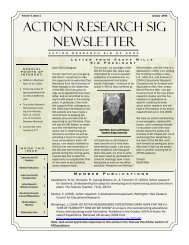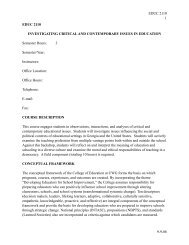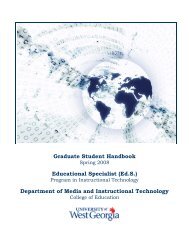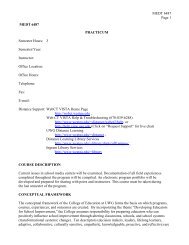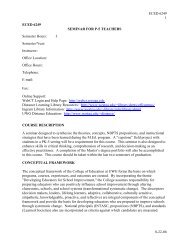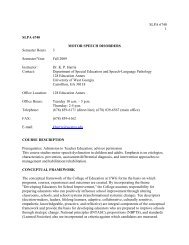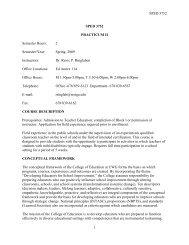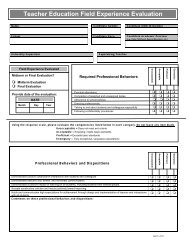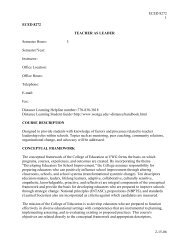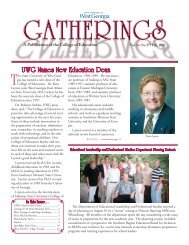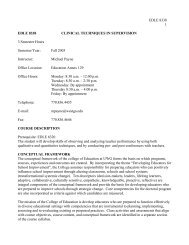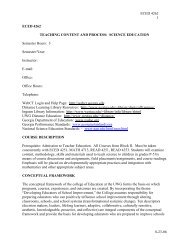sped 7729 special education law - College of Education - The ...
sped 7729 special education law - College of Education - The ...
sped 7729 special education law - College of Education - The ...
You also want an ePaper? Increase the reach of your titles
YUMPU automatically turns print PDFs into web optimized ePapers that Google loves.
SPED <strong>7729</strong><br />
Semester Hours: 3<br />
Semester/Year: Fall 2009<br />
Instructor: Michael Hazelkorn, PhD<br />
Office Location: 118 <strong>Education</strong> Annex<br />
Office Hours: By appointment<br />
Telephone: 678/839-6164<br />
E-mail: mhazelko@westga.edu<br />
Fax: 678-839-6162<br />
COURSE DESCRIPTION<br />
SPECIAL EDUCATION LAW<br />
SPED <strong>7729</strong><br />
1<br />
This course provides public school administrators and teachers the opportunity to examine the<br />
statutory and case <strong>law</strong> requirements <strong>of</strong> educating <strong>special</strong> populations.<br />
CONCEPTUAL FRAMEWORK<br />
<strong>The</strong> conceptual framework <strong>of</strong> the <strong>College</strong> <strong>of</strong> <strong>Education</strong> at the University <strong>of</strong> West Georgia forms<br />
the basis on which programs, courses, experiences, and outcomes are created. By incorporating<br />
the theme “Developing Educators for School Improvement,” the <strong>College</strong> assumes responsibility<br />
for preparing educators who can positively influence school improvement through altering<br />
classrooms, schools, and school systems (transformational systemic change). Ten descriptors<br />
(decision makers, leaders, lifelong learners, adaptive, collaborative, culturally sensitive,<br />
empathetic, knowledgeable, proactive, and reflective) are integral components <strong>of</strong> the conceptual<br />
framework and provide the basis for developing educators who are prepared to improve schools<br />
through strategic change. National principles (ISLLC) and standards (Learned Society) also are<br />
incorporated as criteria against which candidates are measured.<br />
<strong>The</strong> mission <strong>of</strong> the <strong>College</strong> <strong>of</strong> <strong>Education</strong> is to develop educators who are prepared to function<br />
effectively in diverse <strong>education</strong>al settings with competencies that are instrumental to planning,<br />
implementing, assessing, and evaluating existing or proposed practices. This course's objectives<br />
are related directly to the conceptual framework and appropriate descriptors, principles or<br />
propositions, and Learned Society standards are identified for each objective. Class activities and<br />
assessments that align with course objectives, course content, and the conceptual framework are<br />
identified in a separate section <strong>of</strong> the course syllabus.
COURSE OBJECTIVES<br />
Students will:<br />
1. understand the role <strong>of</strong> the federal government and federal courts in the <strong>law</strong> and<br />
administration <strong>of</strong> <strong>special</strong> <strong>education</strong> (Alexander & Alexander, 2005; LaMorte, 2008;<br />
Latham, Latham, & Mand<strong>law</strong>itz, 2008; Underwood & Mead, 1994; Yell, 2006)<br />
(Knowledgeable, Reflective, Culturally Sensitive; ISLLC 4, 5, 6);<br />
SPED <strong>7729</strong><br />
2<br />
2. become familiar with the landmark decisions <strong>of</strong> the United States Supreme Court and the<br />
federal appellate courts and the impact <strong>of</strong> these decisions on the <strong>law</strong> and administration <strong>of</strong><br />
<strong>special</strong> <strong>education</strong> (Bartlett, Etscheidt, & Weisenstein, 2007; Imber & van Geel, 2005;<br />
LaMorte, 2008; Underwood & Mead, 1994; Yell, 2006)<br />
(Knowledgeable, Reflective, Culturally Sensitive; ISLLC 4, 5, 6);<br />
3. develop an understanding <strong>of</strong> the judicial and appellate process at the federal and state levels<br />
and how that relates to <strong>special</strong> <strong>education</strong> <strong>law</strong> (Alexander & Alexander, 2005; LaMorte,<br />
2008; Latham et al., 2008)<br />
(Knowledgeable; ISLLC 4, 5, 6);<br />
4. develop the ability to read a court decision and brief it in order to demonstrate an<br />
understanding <strong>of</strong> its implications for <strong>special</strong> <strong>education</strong> (Alexander & Alexander, 2005; La<br />
Morte, 2008; Valente & Valente, 2005)<br />
(Knowledgeable; ISLLC 4, 5, 6);<br />
5. acquire an understanding <strong>of</strong> legal terminology and procedure as it relates to <strong>special</strong><br />
<strong>education</strong> <strong>law</strong> (Imber & van Geel, 2005; LaMorte, 2008; Latham et al., 2008; Valente &<br />
Valente, 2005)<br />
(Knowledgeable; ISLLC 4, 5, 6); and<br />
6. acquire an understanding <strong>of</strong> the use <strong>of</strong> technology as a means <strong>of</strong> compliance with the<br />
mandates <strong>of</strong> the IDEA and Section 504 <strong>of</strong> the Rehabilitation Act <strong>of</strong> 1973 in the delivery <strong>of</strong><br />
<strong>education</strong>al services to students with disabilities (Yell, 2006)<br />
(Knowledgeable; ISLLC 4, 5, 6).<br />
TEXTS, READINGS, AND INSTRUCTIONAL RESOURCES<br />
Recommended Text:<br />
Yell, M. L. (2006). <strong>The</strong> <strong>law</strong> and <strong>special</strong> <strong>education</strong> (2nd ed.). Upper Saddle River, NJ:<br />
Merrill/Prentice Hall.<br />
References:<br />
Alexander, K., & Alexander, M. D. (2005). American public school <strong>law</strong> (6th ed.). Belmont, CA:<br />
Thomson/West.
SPED <strong>7729</strong><br />
3<br />
Bartlett, L. D., Etscheidt, S., & Weisenstein, G. R. (2007). Special <strong>education</strong> <strong>law</strong> and practice in<br />
public schools (2nd ed.). Upper Saddle River, NJ: Merrill/Prentice Hall.<br />
Imber, M., & van Geel, T. (2005). <strong>Education</strong> <strong>law</strong> (3rd ed.). Mahwah, NJ: McGraw-Hill.<br />
LaMorte, M. (2008). School <strong>law</strong>: Cases and concepts (8th ed.). Boston: Allyn & Bacon.<br />
Latham, P. S., Latham, P. H., & Mand<strong>law</strong>itz, M. R. (2008). Special <strong>education</strong> <strong>law</strong>. Boston:<br />
Pearson/Allyn & Bacon.<br />
Underwood, J., & Mead, J. (1994). Legal aspects <strong>of</strong> <strong>special</strong> <strong>education</strong> and pupil services.<br />
Boston: Allyn & Bacon.<br />
Valente, W. D., & Valente, C. M. (2005). Law in the schools (6th ed.). Upper Saddle River, NJ:<br />
Merrill.<br />
Periodicals - Because <strong>of</strong> the rapidly changing nature <strong>of</strong> <strong>special</strong> <strong>education</strong> <strong>law</strong>, periodicals are<br />
suggested sources <strong>of</strong> reference for supplemental reading and research. <strong>The</strong>se include:<br />
American Law Reports<br />
GLRS Journal<br />
Journal <strong>of</strong> Law and <strong>Education</strong><br />
Lexis Data Base<br />
Special Educator<br />
United States Law Weekly<br />
West’s <strong>Education</strong> Law Reporter<br />
ACTIVITIES AND ASSESSMENTS, EVALUATION PROCEDURES, AND GRADING<br />
Link to Conceptual Framework: <strong>The</strong> assignments are designed to make the students more<br />
knowledgeable about the <strong>law</strong> <strong>of</strong> <strong>special</strong> <strong>education</strong> and to link it to practice. Students will reflect<br />
upon the <strong>law</strong> and make decisions based on what they have learned. Students will become more<br />
culturally sensitive about the impact <strong>of</strong> the <strong>law</strong> upon students with disabilities and students <strong>of</strong><br />
color. <strong>The</strong> three descriptors are reflected in all the assignments and activities.<br />
Activities and Assessments:<br />
1. Module Discussion Questions: Read reading assignments (which are subject to change),<br />
and the court cases and be prepared to actively participate in all the discussion postings.<br />
Students will respond to a discussion prompt provided by the instructor. You are expected<br />
to make an initial posting by the middle <strong>of</strong> the week and follow up with your remaining<br />
postings no later than the day before we next meet. Each discussion is worth 5 points:<br />
posting your initial thoughts (3 pts.), responding to at least two other postings (2 pts.). A<br />
reflective response includes new information, personal perspectives, or other input that<br />
shows thought and consideration <strong>of</strong> the issue. It goes beyond simple agreement or<br />
endorsement <strong>of</strong> responses that already have been posted. Your discussion question grades<br />
will be based on two considerations: active contributions to discussion and obvious<br />
preparation.<br />
(Objectives 1-6; instructor observation, WebCT postings, online discussions)<br />
2. Article Reviews: Complete five (5) article reviews related to the topic <strong>of</strong> the week using<br />
one <strong>of</strong> the assigned readings. Reviews should not exceed three pages per assignment.*
(Objective 4; written product; rubric)<br />
SPED <strong>7729</strong><br />
4<br />
3. Quizzes: Complete 6 online quizzes (10 questions each) made available through WebCT<br />
related to the topic <strong>of</strong> the week using the assigned court cases and lectures.<br />
(Objectives 1-6; quizzes)<br />
4. Final Project: Select an appropriate topic <strong>of</strong> relevant interest (approved by the instructor)<br />
for the preparation <strong>of</strong> a 12-15 page research paper.*<br />
(Objectives 1-6; written product and presentation; rubric)<br />
* Specific directions will be provided for each <strong>of</strong> these requirements.<br />
Evaluation Procedures:<br />
Assignments will be graded by the course instructor based on the information provided in this<br />
syllabus and in additional handout materials and/or discussion. All assignments are due by<br />
midnight on the due date. Late assignments will not be accepted.<br />
Points allocated to assignments are as follows:<br />
1. Discussion Questions - 40 points (13% <strong>of</strong> class grade)<br />
2. Article Reviews (5) - 100 (33% <strong>of</strong> class grade)<br />
3. Quizzes (6) - 60 (20% <strong>of</strong> class grade)<br />
4. Final Project - 100 (33% <strong>of</strong> class grade)<br />
Total - 300<br />
Opportunities for extra credit will not be provided for this class. Work completed for another<br />
class is not acceptable for this class, although students may choose to build on something done<br />
for another class.<br />
Assessment <strong>of</strong> the student’s work by the instructor is an integral part <strong>of</strong> the learning process <strong>of</strong><br />
this course. <strong>The</strong> criteria for the assignment <strong>of</strong> a grade for the research paper are as follows:<br />
A...Papers at this level would be characterized by a clear, thorough, well-organized paper<br />
reflecting a depth <strong>of</strong> substantial understanding <strong>of</strong> the topic. In addition, the author would<br />
have integrated outside research material and required text material, cited relevant and<br />
current authority to support the thesis (with complete reference list), and demonstrated<br />
unusual levels <strong>of</strong> insight and analysis into the issues defined by the question or demonstrated<br />
unusual originality in discussing the question. <strong>The</strong> conclusions in the paper would be without<br />
factual or interpretative errors. Papers would be without (or with very few) errors <strong>of</strong> spelling,<br />
grammar, style, and citation.<br />
B...Papers at this level would be characterized by a better than average understanding <strong>of</strong> the<br />
topic. <strong>The</strong> author would not have shown the levels <strong>of</strong> outside reading or integration evident<br />
or the insight or originality evident in the best papers. <strong>The</strong> papers at this level are also<br />
without factual errors and are without numerous errors <strong>of</strong> spelling, grammar, style, and<br />
citation.
SPED <strong>7729</strong><br />
5<br />
C...Papers at this level would be characterized by a minimum competence and understanding <strong>of</strong><br />
the material. <strong>The</strong> author would have shadowed the work <strong>of</strong> material presented in texts and<br />
articles, but did not extend beyond them in interpretation and originality. Papers at this level<br />
may contain substantive errors and stylistic f<strong>law</strong>s.<br />
F....Papers at this level would be characterized by a f<strong>law</strong>ed understanding <strong>of</strong> the issues and<br />
research. Papers at this level may also violate fundamental standards <strong>of</strong> academic conduct,<br />
such as plagiarism, submission <strong>of</strong> another’ s work as one’s own, or submitting substantially<br />
the same work as has been submitted in another course without the permission <strong>of</strong> the<br />
instructor.<br />
Grading policy:<br />
A = 360-400 points (90%+); B = 320-359 points (80 - 89%); C = 280-319 points (70 - 79%);<br />
F = below 70% or academic dishonesty.<br />
CLASS POLICIES<br />
1. Each student is expected to come prepared to class by having read the assigned readings<br />
and cases and having completed the assignments. Students are expected to submit<br />
assignments on time. Valid reasons for submitting work late must be cleared by the<br />
instructor in advance. It is the student’s responsibility to contact the instructor when<br />
extenuating circumstances take place.<br />
2. Work done outside <strong>of</strong> class must be reasonably correct (not detract from content) in<br />
mechanics (e.g., spelling, grammar, punctuation, etc.). Points will be deducted for<br />
inadequate work. All assignments completed outside <strong>of</strong> class must be typed, double spaced,<br />
using Times, Times New Roman, or Arial font (size 12). All work (done both inside and<br />
outside <strong>of</strong> class) must be reasonably legible.<br />
3. University policy requires that all students have regular access to a computer with at least a<br />
certain capability level (see Catalog, Student Handbook, etc.). All students are required to<br />
make use <strong>of</strong> technological advances in coursework. Students will be required to make use<br />
<strong>of</strong> computer resources in this class, including communication (e.g., class announcements)<br />
and accessing materials needed for class via the Internet and the UWG portal/pipeline.<br />
Some assignments will need to be submitted electronically. In addition, students should<br />
realize that formal communications from UWG will be sent through campus e-mail<br />
(myUWG); this e-mail needs to be checked regularly.<br />
4. Language that is consistent with IDEA and emphasizes people more than disabilities<br />
(“people-first” language) is to be used on assignments prepared outside <strong>of</strong> class.<br />
5. Students are expected to be prompt. It demonstrates respect for the instructor and<br />
classmates and facilitates classroom learning. Two tardies equals one absence. Please<br />
notify instructor <strong>of</strong> any absence in advance, whenever possible. If you will consistently be<br />
unable to attend for the full class time or expect to miss 2 or more classes, it is<br />
recommended that you drop the class and take it during a semester with fewer conflicts.<br />
Under usual circumstances, no make-up activities will be allowed in lieu <strong>of</strong> class<br />
attendance. Exceptions/accommodations may be made for absences due to meeting
SPED <strong>7729</strong><br />
6<br />
contractual work requirements, disability, or serious illness. Missing more than two classes<br />
will result in a one letter grade reduction.<br />
6. Students who miss class (or any portion <strong>of</strong> class) are responsible for the content. While the<br />
instructor is willing to provide additional time for students needing more information about<br />
a particular assignment or particular content, this time is not designed to replace regularly<br />
scheduled class time. Any student who misses a class should take steps to get notes, etc.<br />
from another student(s). If additional assistance is still necessary, an appointment may be<br />
scheduled. Class time is not to be used to go over material with students who have missed<br />
class. Content/activities that are missed will not be retaught/ reviewed unless judged<br />
appropriate for the group as a whole.<br />
7. Submission <strong>of</strong> work taken directly from another source will be considered plagiarism and<br />
grounds for no credit (zero points) on the assignment. However, students are encouraged to<br />
use a variety <strong>of</strong> resources, including the Internet, in obtaining ideas and illustrations which<br />
will help them complete assignments. Resources should be referenced on materials<br />
submitted to the instructor. (Also see <strong>College</strong> <strong>of</strong> <strong>Education</strong> Academic Honesty Statement<br />
below.)<br />
8. Disability policy: All students are provided with equal access to classes and materials,<br />
regardless <strong>of</strong> <strong>special</strong> needs, temporary or permanent disability, <strong>special</strong> needs related to<br />
pregnancy, etc. If you have any <strong>special</strong> learning needs, particularly (but not limited to)<br />
needs defined under the Americans with Disabilities Act, and require specific<br />
accommodations, please do not hesitate to make those known, either yourself or through<br />
the Coordinator <strong>of</strong> Disability Services, Dr. Ann Phillips. Students with documented <strong>special</strong><br />
needs may expect accommodation in relation to classroom accessibility, modification <strong>of</strong><br />
testing, <strong>special</strong> test administration, etc. For more information, please contact Disability<br />
Services at the University <strong>of</strong> West Georgia:<br />
http://www.westga.edu/studentDev/index_8884.php. Any student with a disability<br />
documented through Student Services is encouraged to contact the instructor right away so<br />
that appropriate accommodations may be arranged. In addition, certain accommodations<br />
(which will be discussed in class) are available to all students, within constraints <strong>of</strong> time<br />
and space that may pertain to your program <strong>of</strong> study (http://coe.westga.edu/sedslp/).<br />
CLASS SCHEDULE<br />
Date Topic Readings and Assignments<br />
Aug. 19 Introduction Reading s<br />
Aug. 26-<br />
Sept. 1<br />
Online<br />
<strong>The</strong> IDEA, Section 504, and<br />
the ADA<br />
• Yell, Chapter 1<br />
Readings:<br />
• Yell, Chapters 4-7.<br />
• Zirkel, P. (2000). A two-headed monster. Phi Delta Kappan,<br />
81(5), 410-411.<br />
• Weber, M. (2006). Reflections on the new Individuals with<br />
Disabilities <strong>Education</strong> Improvement Act. Florida Law<br />
Review, 58, 7.<br />
• Yell, M. L., Shriner, J. G., & Katsiyannis, A. (2006).<br />
Individuals with Disabilities <strong>Education</strong> Improvement Act <strong>of</strong><br />
2004 and IDEA regulations <strong>of</strong> 2006: Implications for<br />
educators, administrators, and teacher trainers. Focus on<br />
Exceptional Children, 39(1).<br />
• Blau, A. (2007). <strong>The</strong> IDEIA and the right to an "appropriate"
Sept. 2-8<br />
Sept. 9-15<br />
Online<br />
Sept. 16-<br />
22<br />
Online<br />
Sept. 23-<br />
29<br />
Online<br />
Introduction to Legal<br />
Research<br />
(EC 201)<br />
SPED <strong>7729</strong><br />
7<br />
<strong>education</strong>, BYU Educ. & L. J., 1.<br />
• Zirkel, P. A. (2009). <strong>The</strong> ADAA and its effect on Section 504<br />
students. Journal <strong>of</strong> Special <strong>Education</strong> Leadership, 23(1), 3-<br />
8.<br />
Cases:<br />
• Mills v. Bd. <strong>of</strong> Educ. <strong>of</strong> Columbia, 348 F. Supp. 866 (D.D.C.<br />
1972).<br />
• Southeastern Community <strong>College</strong> v. Davis, 442 U.S. 397<br />
(1979).<br />
• Grube v. Bethlehem Area Sch. Dist. 550 F. Supp. 418 (E.D.<br />
Penn. 1982).<br />
• Sch .Bd. <strong>of</strong> Nassau County v. Arline, 480 U.S. 273 (1987).<br />
• Rothschild v. Grottenthaler, 907 F.2d 286 (2nd Cir. 1990).<br />
• Davis v. Francis Howell Sch. Dist.138 F.3d 754 (8th Cir.<br />
1998).<br />
Readings:<br />
• Yell, Chapters 2-3<br />
Zero Reject Cases:<br />
• Pennsylvania Ass’n for Retarded Citizens (PARC) v.<br />
Pennsylvania, 334 F. Supp. 1257 (E.D. Pa 1971).<br />
• Green v. Johnson, 513 F. Supp. 965 (D. Mass. 1981).<br />
• Doe v. Belleville Public Schools Dist. No. 118, 672 F. Supp.<br />
342 (S.D. Ill. 1987).<br />
• Timothy W. v. Rochester Sch. Dist., 875 F.2d 954 (1st Cir.<br />
1989).<br />
• Handberry v. Thompson, 92 F. Supp. 2d 244 (S.D.N.Y.<br />
Testing, Classification, and<br />
Placement<br />
Free Appropriate Public<br />
<strong>Education</strong><br />
2000).<br />
Readings:<br />
• Yell, Chapter 10<br />
• Garda, R. A., & Stafford, R. (2006). Who is eligible under the<br />
Individuals with Disabilities <strong>Education</strong> Improvement Act?<br />
Journal <strong>of</strong> Law and <strong>Education</strong>, 35, 291.<br />
• Hensel, W. F. (2007). Sharing the short bus: Eligibility and<br />
identity under the IDEA. Hastings Law Journal, 58, 1147.<br />
Cases:<br />
• PASE v. Hannon, 506 F. Supp. 831 (N.D. Ill. 1980).<br />
• Larry P. v. Riles, 793 F.2d 969 (9th Cir. 1984).<br />
• Georgia State Conferences <strong>of</strong> Branches <strong>of</strong> NAACP v.<br />
Georgia, 775 F.2d 1403 (11th Cir. 1985).<br />
• Georgia State Conferences <strong>of</strong> Branches <strong>of</strong> NAACP v.<br />
Georgia, 1986 U.S. Dist. LEXIS 16962 (S.D. Ga. 1986).<br />
• Doe v. Bd. <strong>of</strong> Educ. <strong>of</strong> Connecticut, 753 F. Supp. 65 (D.<br />
Conn. 1990).<br />
• Wenger v. Canastota Sch. Dist., 961 F. Supp. 416 (N.D.N.Y.<br />
1997).<br />
1st Article Review due<br />
Readings:<br />
• Yell, Chapters 9 & 11<br />
• Etscheidt, S. (2007). <strong>The</strong> excusal provision <strong>of</strong> the IDEA<br />
2004: Streamlining procedural compliance or prejudicing<br />
rights <strong>of</strong> students with disabilities? Preventing School<br />
Failure, 51(4), 13-18.
Sept. 30-<br />
Oct. 6<br />
Oct. 7-13<br />
Online<br />
FAPE con’t<br />
Least Restrictive<br />
Environment<br />
SPED <strong>7729</strong><br />
8<br />
• Gartin, B. C., & Murdick, N. L. (2005). IDEA 2004: <strong>The</strong><br />
IEP. Remedial and Special <strong>Education</strong>, 26, 327-331.<br />
• Johnson, S. F. (2003). Reexamining Rowley: A New Focus in<br />
Special <strong>Education</strong> Law. <strong>The</strong> Beacon, 2(2). Retrieved August<br />
6, 2009, from<br />
http://www.harborhouse<strong>law</strong>.com/beacon/2003.v2n2.htm<br />
• Lipsky, D. K. (2005). Are we there yet? Learning Disability<br />
Quarterly, 28, 156-158.<br />
• Yell, M. L., Katsiyannis, A., & Hazelkorn, M. (2007).<br />
Reflections on the 25th anniversary <strong>of</strong> the U.S. Supreme<br />
Court’s decision in Board <strong>of</strong> <strong>Education</strong> v. Rowley. Focus on<br />
Exceptional Children, 39(9).<br />
• Blau, A. (2007). <strong>The</strong> IDEIA and the right to an “appropriate”<br />
<strong>education</strong>. Brigham Young University <strong>Education</strong> and Law<br />
Journal, 1.<br />
Cases:<br />
• Bd. <strong>of</strong> Educ. <strong>of</strong> the Hendrick Hudson Central Sch. Dist. v.<br />
Rowley, 458 U.S. 176 (1982).<br />
• Georgia Assoc. <strong>of</strong> Retarded Citizens v. McDaniel, 716 F. 2d<br />
1565 (11th Cir. 1983).<br />
• Burlington Sch. Committee v. Massachusetts Dep’t <strong>of</strong> Educ.,<br />
471 U.S. 359 (1985).<br />
• Alamo Heights Indep. Sch. Dist. v. State Bd. <strong>of</strong> Educ., 790<br />
F.2d 1153 (5th Cir. 1986).<br />
• Polk v. Central Sasquehanna Intermediate Unit 16, 853 F.2d<br />
171 (3rd Cir. 1988).<br />
• Johnson v. Indep. Sch. Dist. No. 4, 921 F.2d 1022 (10th Cir.<br />
1990).<br />
• Cypress-Fairbanks Indep. Sch. Dist. v. Michael F., 118 F.3d<br />
245 (5th Cir. 1997).<br />
• M.L. v. Federal Way Sch. Dist., 387 F.3d 1101 (9th Cir.<br />
2004).<br />
2nd Article Review due<br />
Readings:<br />
• Yell, Chapter 12<br />
• Etscheidt, S. (2006). Least restrictive and natural<br />
environments for young children with disabilities: A legal<br />
analysis <strong>of</strong> the issues. Topics in Early Childhood Special<br />
<strong>Education</strong>, 26(3), 167-178.<br />
• Palley, E. (2006). Challenges <strong>of</strong> rights-based <strong>law</strong>:<br />
Implementing the least restrictive environment mandate.<br />
Journal <strong>of</strong> Disability Policy Studies, 16, 229-235.<br />
• Roach, V., & Salisbury, C. (2006). Promoting systemic,<br />
statewide inclusion from the bottom up. <strong>The</strong>ory Into Practice,<br />
45, 279-286<br />
• McDonough, C. B. (2008). <strong>The</strong> mainstreaming requirement<br />
<strong>of</strong> the Individuals with Disabilities <strong>Education</strong> Act in the<br />
context <strong>of</strong> Autistic Spectrum Disorders. Fordham Urban Law<br />
Journal, 35, 1225.<br />
• Zirkel, P. (1996). Inclusion: Return <strong>of</strong> the pendulum? <strong>The</strong><br />
Special Educator, 12(9).
Oct. 14-<br />
20<br />
Oct. 21-<br />
27<br />
Online<br />
Oct. 28-<br />
Nov. 3<br />
Online<br />
LRE con’t<br />
SPED <strong>7729</strong><br />
9<br />
• Yell, M. L., & Katsiyannis, A. (2004). Placing students with<br />
disabilities in inclusive settings: Legal guidelines and<br />
preferred practices. Preventing School Failure, 49(1), 28-35.<br />
• Gordon, S. (2006). Making sense <strong>of</strong> the inclusion debate<br />
under IDEA. Brigham Young University <strong>Education</strong> & Law<br />
Journal, 189.<br />
Cases:<br />
• Roncker v. Walter, 700 F.2d 1058 (6th Cir. 1983).<br />
• A.W. v. Northwest R-1 Sch. Dist., 813 F.2d 158 (8th Cir.<br />
1987).<br />
• Lachman v. Illinois State Bd. <strong>of</strong> Educ., 852 F.2d 290 (7th Cir.<br />
1988).<br />
• Daniel R.R. v. State Bd. <strong>of</strong> Educ., 874 F.2d 1036 (5th Cir.<br />
1989).<br />
• Barnett v. Fairfax County Sch. Bd., 721 F. Supp. 757 (E.D.<br />
Va. 1989).<br />
• Greer v. Rome City Sch. Dist., 950 F.2d 688 (11th Cir. 1991).<br />
• Oberti v. Bd. <strong>of</strong> Educ. <strong>of</strong> the Borough <strong>of</strong> Clementon Sch.<br />
Dist., 995 F.2d 1204 (3rd Cir. 1993).<br />
• Sacramento City Unified Sch. Dist. v. Rachel H., 14 F.3d<br />
1398 (9th Cir. 1994).<br />
• Clyde K. v. Puyallup Sch. Dist., 35 F.3d 1396 (9th Cir. 1994).<br />
• Murray v. Montrose County Sch. Dist. RE-1J, 51 F.3d 921<br />
(10th Cir. 1995).<br />
3rd Article Review due<br />
Procedural Safeguards Readings:<br />
• Yell, Chapter 13<br />
• Katsiyannis, A., & Herbst, M. (2004). Minimize litigation in<br />
<strong>special</strong> <strong>education</strong>. Intervention in School and Clinic, 40, 106-<br />
110.<br />
• Lake, J. F., & Billingsley, B. S. (2000). An analysis <strong>of</strong> factors<br />
that contribute to parent-school conflict in <strong>special</strong> <strong>education</strong>.<br />
Remedial and Special <strong>Education</strong>, 21, 240-251.<br />
• Edwards, D. (2005). New amendments to resolving <strong>special</strong><br />
<strong>education</strong> disputes: Any good IDEAs? Pepperdine Dispute<br />
Resolution Law Journal, 5, 137.<br />
Cases:<br />
• Goss v. Lopez, 419 U.S. 565 (1975).<br />
• Hall v. Vance Cty. Bd. <strong>of</strong> Educ., 774 F.2d 629 (4th Cir.<br />
1985).<br />
• Max M. v. Ill. St. Bd. <strong>of</strong> Educ., 629 F. Supp 1504 (N.D. Ill.<br />
1986).<br />
• Spielberg v. Henrico Cty. Public Schools, 853 F.2d 256 (4th<br />
Cir. 1988).<br />
• Deal v. Hamilton Cty. Bd. <strong>of</strong> Educ., 392 F.3d 840 (6th Cir.<br />
Damages, Reimbursement,<br />
and Compensatory <strong>Education</strong><br />
2004).<br />
Readings:<br />
• Bateman, D. F. (2007). Compensatory <strong>education</strong>: A case<br />
study. Teaching Exceptional Children, 39(6), 62-64.<br />
• Bateman, D. F. (2007). Compensatory <strong>education</strong>: A case<br />
study. Teaching Exceptional Children, 39(4), 69-71.
Nov. 4-10<br />
Nov. 11-<br />
17<br />
Online<br />
Shared Decision Making<br />
SPED <strong>7729</strong><br />
10<br />
• Katsiyannis, A., & Herbst, M. (2004). Punitive damages in<br />
<strong>special</strong> <strong>education</strong>. Journal <strong>of</strong> Disability Policy Studies, 15, 9-<br />
11.<br />
• Daggett, L. M. (2004). Special <strong>education</strong> attorney's fees: Of<br />
Buckhannon, the IDEA reauthorization bills, and the IDEA as<br />
civil rights statute. UC Davis Journal <strong>of</strong> Juvenile Law &<br />
Policy, 8, 1.<br />
Cases:<br />
• Burlington<br />
• Florence County Sch. Dist. Four v. Carter, 510 U.S. 7<br />
(1993).<br />
• Jefferson County Bd. <strong>of</strong> Educ. v. Breen, 853 F.2d 853 (11th<br />
Cir. 1988).<br />
• Ms. M. v. Portland Sch. Committee., 360 F.3d 267 (1st Cir.<br />
2004).<br />
• Greenland Sch. Dist. v. Amy N., 358 F.3d 150 (1st Cir. 2004).<br />
• Reid v. District <strong>of</strong> Columbia, 401 F.3d 516 (D.C. Cir. 2005).<br />
• Ortega v. Bibb Cty. Sch. Dist., 397 F.3d 1321 (11th Cir.<br />
2005).<br />
Readings:<br />
• Zirkel, P. A. (1992). Offensive parents. Phi Delta Kappan,<br />
73, 572-574.<br />
• Zirkel, P. A. (2002). Impossible parents? Phi Delta Kappan,<br />
84, 335-336.<br />
4th Article Review due<br />
Related Services Cases:<br />
• Irving Indep. Sch. Dist. v. Tatro, 468 U.S. 883 (1984).<br />
• Cohen v. Sch. Bd., 450 So.2d 1238 (Fla. 1984).<br />
• Hurry v. Jones, 734 F.2d 879 (1st Cir. 1984).<br />
• Detsel v. Bd. <strong>of</strong> Educ. <strong>of</strong> the Auburn Enlarged City Sch. Dist.,<br />
820 F.2d 587 (2nd Cir. 1987).<br />
• Babb v. Knox County Sch. System, 965 F.2d 104 (6th Cir.<br />
1992).<br />
• Cedar Rapids Community. Sch. Dist. v. Garret F., 526 U.S.<br />
66 (1999).<br />
Discipline Readings:<br />
• Yell, Chapter 14<br />
• Kauffman, J. M., & Brigham, F. J. (2000). Zero tolerance and<br />
bad judgment in working with students with emotional and<br />
behavioral disorders. Behavioral Disorders, 25, 277-279.<br />
• Skiba, R. (2002). Special <strong>education</strong> and school discipline: A<br />
precarious balance. Behavioral Disorders, 27, 81-97.<br />
• Maag, J. W., & Katsiyannis, A. (2006). Behavioral<br />
intervention plans: Legal and practical considerations for<br />
students with emotional and behavioral disorders. Behavioral<br />
Disorders, 31, 348-362.<br />
• Ryan, J. B., Katsiyannis, A., Peterson, R., & Chmelar, R.<br />
(2007). IDEA 2004 and disciplining students with<br />
disabilities. NASSP Bulletin, 91, 130-140.<br />
Cases:<br />
• Victoria L. v. Dis. Sch. Bd., 741 F.2d 369 (11th Cir. 1984).<br />
• Honig v. Doe, 484 U.S. 305 (1988).<br />
• Light v. Parkway C-2 Sch. Dist., 41 F.3d 1223 (8th Cir.
SPED <strong>7729</strong><br />
11<br />
1994).<br />
• Rodiriecus L. v. Waukegan Sch. Dist. No. 60, 90 F.3d 249<br />
(7th Cir. 1996).<br />
• A.W. v. Fairfax Cty. Sch. Bd., 372 F.3d 674 (4th Cir. 2004).<br />
• Alex R. v. Forrestville Valley Comm. Unit Sch. Dist. #221,<br />
375 F.3d 603 (7th Cir. 2004).<br />
5th Article Review due<br />
Nov. 18- Discipline con’t<br />
24 Outstanding issues<br />
Nov. 25 Thanksgiving Recess No class<br />
Dec. 2 STUDENT<br />
PRESENTATIONS<br />
Final project due<br />
No Child Left Behind Readings:<br />
• Yell, Chapter 8<br />
• Applicable sections <strong>of</strong> No Child Left Behind: A Desktop<br />
Reference<br />
(http://www.ed.gov/admins/lead/account/nclbreference/page.<br />
html)<br />
• Olson, L. (2004, August 11). Critics float ‘No Child’<br />
revisions. <strong>Education</strong> Week, pp. 1, 33.<br />
• Perry Zirkel, <strong>The</strong> NCLB: Implications for Students with<br />
Disabilities, 185 EDUC. L. REP. [885] (2004).<br />
• Perry Zirkel, Initial Implications <strong>of</strong> the NCLB for Section<br />
504, 191 EDUC. L. REP. [541] (2004).<br />
English Language Learners Readings:<br />
• Applicable sections <strong>of</strong> the OELA's National Clearinghouse<br />
for English Language Acquisition & Language Instruction<br />
<strong>Education</strong>al Programs (NCELA) (http://www.ncela.gwu.edu)<br />
• Garcia, S. B., & Ortiz, A. A. (1988). Preventing<br />
inappropriate referrals <strong>of</strong> language minority students to<br />
<strong>special</strong> <strong>education</strong>. Washington, DC: U.S. Department <strong>of</strong><br />
<strong>Education</strong>, Office <strong>of</strong> Bilingual <strong>Education</strong> and Minority<br />
Language Affairs.<br />
(http://www.ncela.gwu.edu/pubs/classics/focus/05referral.ht<br />
m)<br />
• McLaughlin, B. (1992). Myths and Misconceptions about<br />
second language learning: What every teacher needs to<br />
unlearn (<strong>Education</strong>al Practice Rep.: 5). University <strong>of</strong><br />
California, Santa Cruz: National Center for Research on<br />
Cultural Diversity and Second Language Learning.<br />
(http://www.ncela.gwu.edu/pubs/ncrcdsll/epr5.htm)<br />
• Barrera, I. (1995). To refer or not to refer: Untangling the<br />
web <strong>of</strong> diversity, “deficit,” and disability. New York<br />
Association for Bilingual <strong>Education</strong> Journal, 10, pp. 54-66.<br />
(http://www.ncela.gwu.edu/pubs/nysabe/vol10/nysabe107.ht<br />
m)<br />
• Zhao, Y. (2002, August 5). Wave <strong>of</strong> pupils lacking English<br />
strains schools. <strong>The</strong> New York Times, p. A1.<br />
• Salend, S. J., & Salinas, A. (2003). Language differences or<br />
learning difficulties: <strong>The</strong> work <strong>of</strong> the multidisciplinary team.<br />
Teaching Exceptional Children, 35(4), pp. 36-43.<br />
•<br />
Cases:<br />
Zhao, Y. (2002, August 5). Wave <strong>of</strong> pupils lacking English<br />
strains schools. <strong>The</strong> New York Times, p. A1.
ACADEMIC HONESTY<br />
SPED <strong>7729</strong><br />
12<br />
• Lau v. Nichols, 414 U.S. 563 (1974).<br />
• Plyler v. Doe, 457 U.S. 202 (1982).<br />
• Teresa P. v. Berkeley Unified Sch. Dist., 724 F. Supp. 698<br />
(N.D. Cal. 1989).<br />
Students are expected to adhere to the highest standards <strong>of</strong> academic honesty. Plagiarism occurs<br />
when a student uses or purchases ghost-written papers. It also occurs when a student utilizes the<br />
ideas <strong>of</strong> or information obtained from another person without giving credit to that person. If<br />
plagiarism or another act <strong>of</strong> academic dishonesty occurs, it will be dealt with in accordance with<br />
the academic misconduct policy as stated in <strong>The</strong> Student Handbook, Undergraduate Catalog,<br />
and Graduate Catalog.



